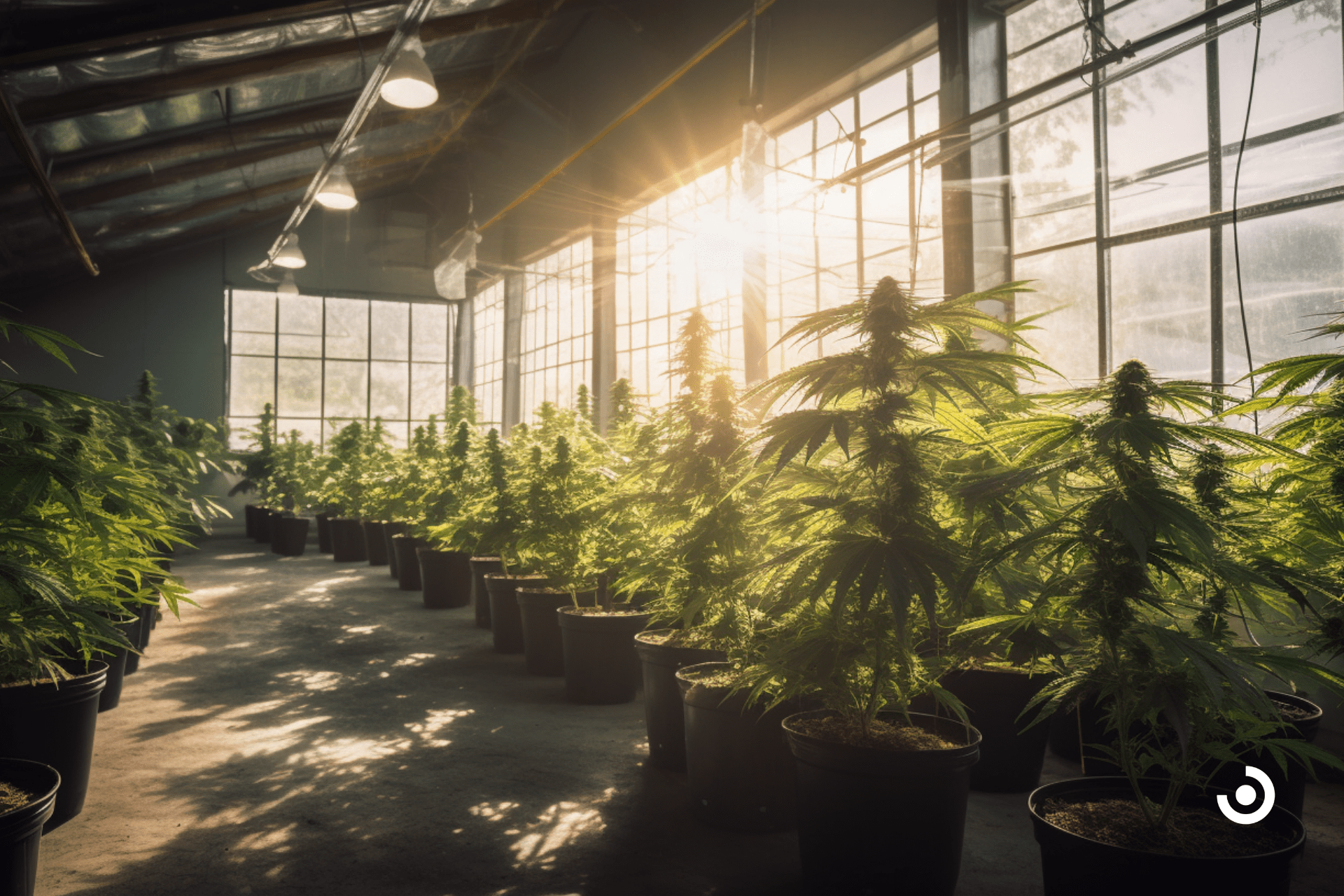Understanding Cannabis Cultivation Laws: What You Need To Know
by Ayesha Aziz · January 9, 2024
Stay informed about cannabis cultivation laws with this comprehensive guide. Learn everything you need to know and stay ahead of the game. Don’t miss out, click here now!

Are you interested in entering the cannabis industry, specifically in cannabis cultivation? It’s important to understand the laws and regulations surrounding cannabis cultivation to ensure you comply and avoid any legal consequences. According to reports, “The total U.S. cannabis supply is expected to top 48.8 million pounds.”
In this article, we will provide you with an overview of cannabis cultivation laws, including licensing and permit requirements, zoning and location restrictions, and security and compliance measures. By the end of this article, you will have a comprehensive understanding of what it takes to legally cultivate cannabis and be equipped with the knowledge to navigate the industry successfully.
Whether you are a budding entrepreneur or simply curious about the cannabis cultivation process, this article will guide you to understand the legal framework governing this industry.
From the specific licenses and permits required to the restrictions on where you can set up your cultivation operation, we will cover all the essential information you need to know. Additionally, we will delve into the crucial security and compliance measures that must be in place to ensure the safety and integrity of your cannabis cultivation business.
Key Takeaways
- Illegal cannabis cultivation can result in hefty fines and imprisonment.
- Engaging in illegal cultivation can have long-term consequences such as a criminal record, impacting employment, housing, and travel opportunities.
- Illegal cultivation can damage one’s reputation and make it difficult to rebuild one’s life after serving a sentence.
- Understanding cannabis cultivation laws is crucial to avoid legal trouble and ensure compliance with regulations.
Overview of Cannabis Cultivation Laws
When it comes to cannabis cultivation, the laws can vary significantly from state to state. In some states, it’s completely legal to grow cannabis for personal use, while in others, it’s strictly prohibited. However, what may surprise you is that even in states where cannabis cultivation is legal, there are often strict regulations and licensing requirements in place.
For example, in California, where cannabis cultivation is legal for both medical and recreational use, there are specific laws governing the size of the cultivation area, the number of plants that can be grown, and the type of security measures that must be in place. These regulations are in place to ensure that cannabis cultivation is done responsibly and safely.
It’s also worth noting that even in states where cannabis cultivation is legal, there are often restrictions on where it can be grown. For example, it may only be allowed in certain designated areas or within a certain distance from schools or other sensitive locations.
Understanding the specific laws and regulations in your state is crucial if you’re considering getting into cannabis cultivation. It’s essential to familiarize yourself with the requirements and ensure that you comply to avoid any legal issues.
Additionally, staying informed about any changes or updates to the laws is important, as they can often evolve over time. By staying educated and following the regulations, you can ensure that your cannabis cultivation endeavors are not only legal but also responsible and safe.
Differentiating Between Medical and Recreational Cannabis Laws
Did you know there’s a key distinction between the laws governing medical and recreational cannabis? Understanding this difference is crucial for anyone interested in cannabis cultivation. While both medical and recreational cannabis are legal in some states, the laws surrounding their cultivation and use can vary significantly.
Medical cannabis laws are designed to provide access to cannabis for individuals with specific medical conditions. These laws typically require patients to obtain a recommendation from a healthcare coach professional and register with a state program. The cultivation of medical cannabis is often tightly regulated, with specific requirements for licensing, security, and quality control. This ensures that patients receive safe and effective products that meet their medical needs.
On the other hand, recreational cannabis laws are focused on allowing adults to use cannabis for personal enjoyment. In states where recreational cannabis is legal, individuals can purchase cannabis from licensed dispensaries without needing a medical recommendation. The cultivation of recreational cannabis may also be permitted, but the regulations are generally less strict compared to medical cannabis. However, it’s important to note that even in states where recreational cannabis is legal, there are usually limitations on the amount of cannabis that can be grown and possessed.
Understanding the differences between medical and recreational cannabis laws is essential for anyone considering cannabis cultivation. Whether you’re interested in growing cannabis for medical purposes or personal enjoyment, it’s crucial to familiarize yourself with the specific laws in your state. By doing so, you can ensure that you’re abiding by the regulations and serving others responsibly and legally.
Licensing and Permit Requirements
To obtain a license for cannabis cultivation, you’ll have to navigate through a complex web of permit requirements. It can be overwhelming, but you can make the process smoother with the right guidance. Here are four key points to keep in mind:
- Research the specific requirements: Each state and jurisdiction has its own set of rules and regulations for cannabis cultivation. It’s crucial to research and understand the specific requirements in your area thoroughly. This includes determining the type of license you need, the application process, and any additional permits or certifications that may be required.
- Prepare a detailed business plan: One of the most important aspects of obtaining a cannabis cultivation license is demonstrating a solid business plan. This includes outlining your cultivation methods, security measures, staffing plans, and financial projections. A well-prepared business plan will increase your chances of obtaining a license and showcase your commitment to operating a successful and compliant cultivation business.
- Meet all zoning and land use requirements: Cannabis cultivation is subject to strict zoning and land use regulations. Before applying for a license, ensuring that your chosen location meets all the requirements is essential. This may include restrictions on proximity to schools, residential areas, or other sensitive locations. Reviewing the zoning laws carefully and obtaining any required permits or variances before proceeding with your application is important.
- Engage with the local community: Building strong relationships within the local community can greatly benefit your license application. Engage with community organizations, attend public meetings, and address any concerns or questions from neighbors or local officials. You can gain support and increase your chances of obtaining a license by demonstrating your commitment to being a responsible and positive community member.
Navigating the licensing and permit requirements for cannabis cultivation can be complex, but by following these guidelines and seeking professional advice when needed, you can increase your chances of success.
Zoning and Location Restrictions
Imagine yourself navigating through a maze of regulations and restrictions, trying to find the perfect spot to grow your cannabis plants. Zoning and location restrictions are crucial factors to consider when entering the world of cannabis cultivation.
You need to be aware of the specific areas where you’re allowed to grow cannabis, as well as any limitations or requirements imposed by local authorities. One of the key things to understand is that zoning regulations vary from one jurisdiction to another. Some areas may have specific zones designated for cannabis cultivation, while others may prohibit it altogether.
It’s important to research and familiarize yourself with the zoning laws in your area to ensure compliance and avoid any potential legal issues. Additionally, location restrictions may apply, dictating where you can set up your cannabis cultivation operation. These restrictions include proximity to schools, playgrounds, residential areas, and other sensitive locations.
It’s crucial to respect these limitations and find a suitable location that meets all the necessary criteria. By understanding and adhering to zoning and location restrictions, you’re ensuring compliance with the law and demonstrating a commitment to serving others. It shows that you’re respectful of the surrounding community and are willing to take the necessary steps to minimize any potential negative impacts.
Security and Compliance Measures
Security and compliance measures for cannabis cultivation include implementing surveillance systems, controlling facility access, and maintaining proper documentation.
Regarding the security of your cannabis cultivation operation, it’s crucial to prioritize the safety of your staff, customers, and the community. By implementing surveillance systems, you can monitor your facility 24/7 and immediately identify and address any suspicious activities. This helps prevent theft and unauthorized access and ensures that you comply with local regulations.
Controlling access to your cultivation facility is another important aspect of security and compliance. By limiting who can enter your facility and implementing strict protocols, you can prevent unauthorized individuals from gaining access to your cannabis plants. This includes using key cards, biometric systems, and security guards to ensure that only authorized personnel are allowed entry.
Additionally, maintaining proper documentation is essential for compliance with cannabis cultivation laws. This includes keeping detailed records of your cultivation activities, such as the types and quantities of cannabis plants grown and any pesticides or fertilizers used. By keeping accurate records, you can demonstrate your compliance with regulations and ensure that your operation operates smoothly and legally.
Environmental Considerations and Sustainability Practices in Cannabis Cultivation
Environmental considerations and sustainability practices play a crucial role in the cultivation of cannabis, ensuring that the process is both eco-friendly and mindful of the resources used. As a cannabis cultivator, it is important to be aware of the environmental impact of your operations and take steps to minimize your carbon footprint. By implementing sustainable practices, you can not only contribute to a healthier planet but also enhance the quality of your cannabis products.
One way to incorporate sustainability into your cannabis cultivation is by utilizing renewable energy sources. Consider installing solar panels or wind turbines to power your growing operations. This not only reduces your reliance on fossil fuels but also saves on electricity costs in the long run. Additionally, implementing water conservation measures is essential in cannabis cultivation. Use drip irrigation systems and collect rainwater to minimize water waste. This not only helps conserve a precious resource but also reduces the strain on local water supplies.
Table:
| Sustainable Practices | Benefits |
|---|---|
| Utilizing renewable energy sources (e.g., solar panels, wind turbines) | Reduces reliance on fossil fuels and saves on electricity costs |
| Implementing water conservation measures (e.g., drip irrigation, rainwater collection) | Minimizes water waste and reduces strain on local water supplies |
| Using organic and natural pest control methods | Prevents the harmful effects of synthetic pesticides on the environment and consumers |
Another important aspect of sustainability in cannabis cultivation is the use of organic and natural pest control methods. Avoiding the use of synthetic pesticides not only prevents harm to the environment but also ensures that your cannabis products are safe for consumption. Explore alternative pest control methods such as companion planting, beneficial insects, and organic sprays to maintain a healthy and pest-free cultivation environment.
By incorporating these sustainable practices into your cannabis cultivation, you are not only reducing your environmental impact but also producing high-quality cannabis products. Your efforts will contribute to a healthier planet and serve the needs of your customers who are looking for eco-friendly options. Remember, by taking care of the environment, you are also serving the greater good and making a positive impact on the world.
Potential Penalties and Legal Consequences
Contrary to popular belief, getting caught in an illegal cannabis cultivation operation can result in severe penalties and legal consequences. It’s not just a slap on the wrist or a minor fine.
The laws surrounding cannabis cultivation are strict, and the penalties can be life-altering. If you’re thinking about engaging in illegal cultivation, it’s important to understand the potential risks and consequences.
First and foremost, you could face significant fines. Depending on the jurisdiction, these fines can range from a few thousand dollars to tens of thousands of dollars. In addition to the financial burden, you could also face imprisonment. The length of the sentence will vary depending on the scale of the operation and other factors, but it’s not uncommon for individuals to face several years behind bars.
Moreover, getting caught in an illegal cannabis cultivation operation can have long-term consequences on your personal and professional life. A criminal record can make securing employment, obtaining housing, or even traveling to certain countries difficult. It can tarnish your reputation and make it challenging to rebuild your life after serving your sentence. It’s important to consider these potential consequences before engaging in illegal cultivation.
Do you want to read more about cannabis, read our latest blog, How Cannabis Can Help With Anxiety.
Frequently Asked Questions
Are there any restrictions on the types of strains or genetics that can be cultivated under cannabis cultivation laws?
Yes, there are restrictions on the types of strains or genetics that can be cultivated under cannabis cultivation laws. These laws often limit the THC levels in plants and may require licensing for specific strains.
Can individuals grow cannabis for personal use without obtaining a license or permit?
Want to grow cannabis for personal use? Well, here’s the deal – you may not need a license or permit, but there are restrictions. Can you navigate through them and turn your green thumb dreams into reality?
Are there any limitations on the number of plants that can be cultivated under cannabis cultivation laws?
Yes, there are limitations on the number of plants you can cultivate under cannabis cultivation laws. The specific limits depend on your location and whether you have a license or permit.
Are there any specific regulations regarding the use of pesticides or other chemicals in cannabis cultivation?
Yes, there are specific regulations regarding the use of pesticides and other chemicals in cannabis cultivation. It’s crucial to follow these guidelines to ensure the safety and quality of the product you’re growing.
How do cannabis cultivation laws differ between medical and recreational marijuana?
When it comes to cannabis cultivation, laws differ for medical and recreational marijuana. There are specific regulations in place to ensure the safety and quality of both types, catering to the unique needs of each.
Last Updated: August 8, 2024
Get Approved for Your Medical Marijuana Card in Minutes!

Get Your Medical Card
Connect with a licensed physician online in minutes

Like This Article?
Share with your friends
Table of Contents
Keep Reading
-
How To Get Weed Out Of Your System
Learn the best ways to flush weed out of your system and pass drug tests effortlessly. Click now for our ultimate guide on how to get weed out of your system and say goodbye to traces.
-
3 Steps for PA Medical Marijuanas Card Renewal Success
Navigate the PA medical marijuanas card renewal process with ease and success.
-
Unlocking Calm: How Medical Marijuana Aids Anxiety And Patient Access
Unlock the secrets to true calm with medical marijuana for anxiety. Learn how this powerful treatment can improve patient access and alleviate anxiety symptoms. Click here to find out more!



